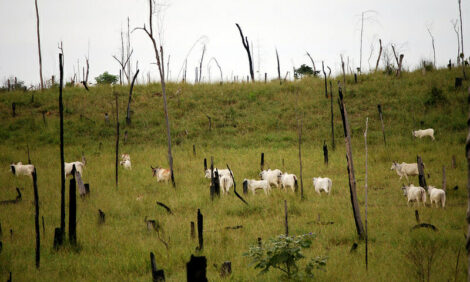



20 Per Cent Of Cattle Livers Condemned
UK - According to recent figures from the Meat Hygiene Service, more than one in five cattle sent to slaughterhouses in the UK have their livers condemned as a result of damage caused by liver fluke.The statistics, which were collected throughout 2009, showed an average condemnation figure across England, Wales and Scotland of just over 20 per cent.
Slaughterhouses in England recorded an incidence of nearly 18 per cent, whilst more than a quarter of all cattle that went for slaughter in Scotland and Wales had their livers condemned due to fluke.
Figures for individual abattoirs obtained by animal health company Merial, show even more worrying figures, with some abattoirs reporting up to 60 per cent of cattle livers condemned due to liver fluke.
Fiona MacGillivray, Merial’s veterinary adviser said: “These figures are part of an overall trend that shows a rise in the level of liver fluke. The number of cases of fluke in cattle recorded by the Veterinary Investigation Diagnosis Analysis (GB) database nearly tripled between 2001 and 20081.
"As a result of the generally milder, wetter weather experienced in recent years and the movement of infected animals, areas of the country that were once considered fluke-free have been recording cases of fluke. Furthermore, the fluke season has extended such that fluke is no longer just an autumn and winter problem but a spring and summer one too.”
Whilst many farmers treat their cattle for fluke at housing, few are aware of the benefits of administering a dose whilst cattle are at grass 8 – 10 weeks post-turnout.
Research shows that fluke infestation depresses appetite and can also impair the body’s ability to convert feed to body mass. Indeed, liver fluke infestation in growing cattle has been shown to depress liveweight gain by up to 1.2kg/week.
Dr Phil Hadley, South West Regional Manager with EBLEX, says: “Because often there can be no obvious clinical signs of fluke infestation in cattle, many farmers don’t realise that it is costing them money. Put simply, it is adding days to the time it takes to finish the animal and every day costs the farmer money. Treating for fluke will increase productivity, decrease finishing time and also reduce the chances of re-infestation. Both the scientific data available and the feedback from abattoirs suggest that fluke is on the increase. It is a major problem for the whole industry.”
In terms of treatment at grass, farmers have the option to choose a straight fluke product such as Trodax®, which can be given alongside an existing wormer treatment, or alternatively a combination endectocide such as Ivomec® Super can be used. Not only does Ivomec® Super control fluke, it also has the advantage of providing persistent protection against roundworms so, in effect, can be used to replace an existing worm treatment in a strategic control programme.
Merial say that both Trodax® and Ivomec® Super have been successfully used on farm for more than 20 years and neither product is affected by rainfall, which is important when we are faced with increasingly wet summers.
TheCattleSite News Desk


